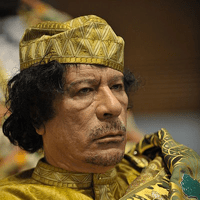One year ago, Moammar Gadhafi's Libya was being praised for its efforts to become a responsible stakeholder in the international system. Meanwhile, Gadhafi's children, especially his son Saif al-Islam, were being cultivated as the best hope for initiating a process of political and economic reform, so that Libya might replicate the path blazed by Taiwan, where another dynastic transfer of power from father to son led to democratization. Indeed, Gadhafi's son Khamis was in the United States on a professional internship when the current crisis broke out. He was quickly recalled to take command of the 32nd Reinforced Brigade of the Armed People, described as the best-trained and equipped unit within the Libyan military and security forces, and a key element in the regime's efforts to retain power.
Today, the position of the Western alliance is clear: The ultimate goal in Libya is regime change. Libyan rebels may complain that NATO is doing far too little to aid their cause, and it is true that the alliance is reluctant to commit itself to becoming the air-power arm of the provisional government. But while the Gadhafi regime may indeed linger on longer than the hypershortened news cycle, which demands results in hours, and might even enjoy a pyrrhic victory against the current Benghazi-based rebellion, the U.S.-led air campaign has dealt it a mortal blow. Over the past month, Gadhafi has seen his air force grounded, a large portion of his heavy military assets destroyed, his ports blockaded and his assets frozen. He cannot replenish his forces nor, in the manner of King Abdullah of Saudi Arabia, rely on his oil wealth to bribe his subjects back into compliance. Gadhafi will not enjoy the blessings of dying peacefully in his bed, with a son firmly in charge of the Great Socialist People's Libyan Arab Jamahiriya.
What a difference a year makes!

